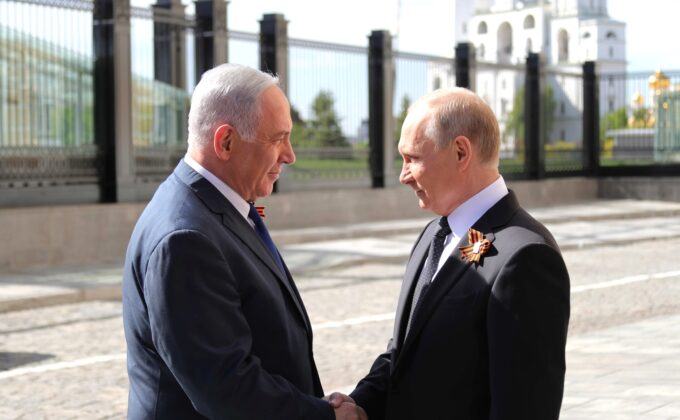On the ICC, Putin, Netanyahu and Prosecutorial Discretion

Photograph Source: kremlin.ru – CC BY 4.0
All wars, which by their nature involve killing people and destroying property and infrastructure, are brutal and ugly and give rise to hundreds of events which can be qualified as “war crimes”. The current war on the territory of Ukraine is surely no exception.
In applying international law, as in applying national and domestic laws, no prosecutor can pursue and prosecute more than a miniscule percentage of potential offenses and crimes. As a practical matter, prosecutorial “discretion” as to what matters to pursue is unavoidable, and, inevitably, this discretion is often highly subjective and even “politically motivated”.
As the whole world is now aware, the International Criminal Court, at the instigation of its British chief prosecutor, issued on March 17 arrest warrants against President Vladimir Putin and Russia’s commissioner for children’s rights for alleged war crimes. The ICC’s formal statement announcing these warrants stated that “there are reasonable grounds to believe that each subject bears responsibility for the war crime of unlawful deportation of population and that of unlawful transfer of population from occupied areas of Ukraine to the Russian Federation.”
The relevant provision of the Rome Statute establishing the ICC is Article 8, which contains a long list of “wars crimes” as to which the ICC has jurisdiction, and, in this particular instance, Article 8(b)(viii), which characterizes as a war crime “the transfer, directly or indirectly, by the Occupying Power of parts of its own civilian population into the territory it occupies, or the deportation or transfer of all or parts of the population of the occupied territory within or outside this territory.”
Russia has scarcely been shy about the program cited in these arrest warrants. Indeed, it has publicized this program as a humanitarian effort intended to bring children from active war zones to safety. (Frankly, given the inherent horrors of war, it is surprising that the ICC prosecutors could not have come up with some more brutal and ugly alleged crime.)
Be that as it may, Article 8(b)(viii) contains no qualification as to motivations or consequences. Accordingly, as a matter of strict statutory interpretation in a context of prosecutorial discretion, these arrest warrants, albeit issued with remarkable rapidity by the ICC’s habitual snail-speed standards, are probably justifiable.
The ICC’s remarkable rapidity in this case can be at least partially explained by a highly significant disclosure in a news report published by the New York Times on March 18: “The court in The Hague acted unusually fast in this case…. Key donors, including the European Union, sent money and dozens of prosecutors to speed up what is often seen as a plodding bureaucracy.”
That said, many serious human rights advocates have been waiting impatiently, even if only with limited expectations, for the ICC to apply Article 8(b)(viii) to Israeli war criminals and to issue indictments and arrest warrants for Benjamin Netanyahu and a selection of other individuals from the long list of likely Israeli war criminals, with an announcement which might read: “There are reasonable grounds to believe that each subject bears responsibility for the war crime of unlawful transfer by the Occupying Power of parts of its own civilian population into the territory it occupies.”
Israeli settlement activity is the most obvious and indisputable of Israel’s many war crimes. From a judicial standpoint, it is a slam-dunk.
Whatever one may think of the arrest warrants issued against Russians for alleged violations of Article 8(b)(viii), the failure of the ICC, at least so far, to issue indictments and arrest warrants against Israelis for their violations of Article 8(b)(viii) constitutes an egregious abuse of prosecutorial discretion, and, if the two cases are viewed together, gives rise to an odorous presumption of political motivations, threatening to tarnish further the already dubious reputation of the ICC for the impartial pursuit of justice.
One might hope that the British chief prosecutor will now seek to fend off accusations of political motivations by finally indicting some Israelis, but one should not hold one’s breath.
In order to discourage ICC investigations into American war crimes in Afghanistan and Israeli war crimes in Palestine, the Trump administration imposed sanctions on the ICC as an institution and on its former chief prosecutor as an individual and threatened to impose both civil and criminal penalties against other ICC personnel and those who support its work. The Biden administration rescinded these sanctions only after the current British chief prosecutor agreed to drop the investigation into American war crimes.
However, the message that extreme prosecutorial discretion should be exercised when considering investigating citizens of certain countries has presumably been clearly and emphatically received at the ICC.
In accordance with the fundamental rule of the U.S.-dictated “rules-based international order”, which is antithetical to international law, it is not the nature of the act that matters but, rather, who is doing it to whom.

0 Comments:
Post a Comment
Subscribe to Post Comments [Atom]
<< Home